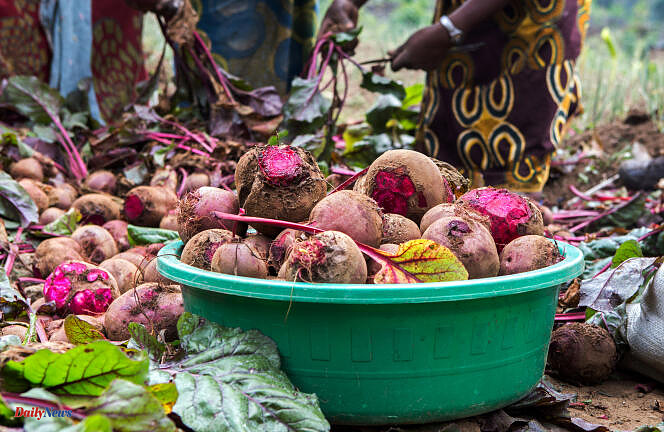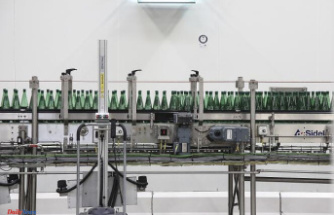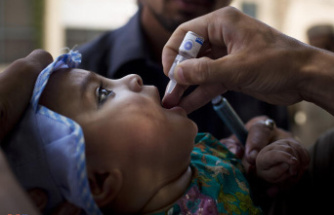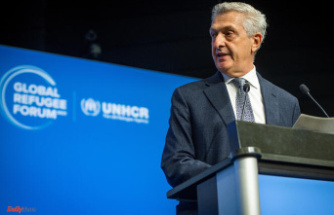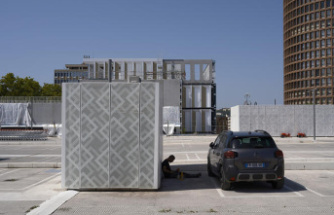Contemplating the shimmering plantations of Joséphine Mukankusi’s farm is like taking in the agricultural problems of Rwanda at a glance. There, in the northwest of the country, on the edge of the village of Karurambi, the retired teacher uses every square meter of her acres, terraced on the slopes of the Karisimbi volcano. Cabbages, eggplants, beans, spinach, onions, beets, cassava, cereals, herbs, vegetables, shrubs... It is difficult to list this abundant diversity which nevertheless falls within a precise framework: that of the development of ecological and sustainable agriculture in an overpopulated country, with overexploited soils which do not ensure the food security of the population.
Rwanda actually holds a record that it could do without. With 13.3 million inhabitants concentrated in a territory smaller than Belgium, it has the highest population density on the continent: 483 inhabitants per km2, compared to an average of 23 in Africa. However, in the country known as “a thousand hills”, the terrain is often steep. Urbanization is reaching the countryside of this rural country at 70%. The cultivated plots are tiny, fragmented by strong population growth, even if the fertility rate is falling (3.8 children per woman in 2021, compared to 6 in 2000).
Nearly two out of three Rwandans are farmers, yet the primary sector contributed in 2022 to the creation of only a quarter of national wealth. “People are no longer dying of hunger, but the quality of their food is not good, a third of children are malnourished and suffer from stunted growth, especially in the countryside,” observes Vedaste Mwenende, head of project monitoring at within the Association for Cooperation and Research for Development (Acord).
Joséphine Mukankusi and the thirty families who are members of the same local agricultural association are doing better than most of the surrounding farmers. Certainly, the land in this region – the country’s leading potato producer – is fertile. But its success comes from elsewhere, “against the grain of official policy”, explains Vedaste Mwenende.
Planned intervention
In the agricultural field, this policy has been detailed since 2007 in the Crop Intensification Program (CIP, in its English acronym), prioritizing six crops: corn, wheat, cassava, beans, potatoes and rice. “Farmers who contradicted this agricultural planning by diversifying their plantations saw them uprooted,” recalls Vedaste Mwenende. Because under the rule of Paul Kagame, in power since 1994, planned dirigisme is the rule. Once decisions are made, their implementation is often unstoppable.
“But that does not prevent questioning and adjustments if the program does not achieve its objectives and the “big boss” becomes aware of it,” deciphers a Rwandan consultant. Little by little, the authorities are relaxing the application of the CIP, which is poorly suited to microplots, which impoverishes the soil and makes people dependent on chemical fertilizers.
With the Acord, since 2018, Joséphine Mukankusi has taken a completely different path. The association's agronomists teach him the techniques of diversified and nature-friendly agriculture. The Agreement provides basic construction materials to get started in the activity. Today, Joséphine Mukankusi's pride is measured by the enthusiasm she displays to tour the owner. There, behind the house, is a stable where a pregnant cow feeds. Its urine which flows into a reservoir will enrich plant compost. The manure will also be used as fertilizer, the milk for daily food.
She also knows all the secrets of the “push-pull” technique consisting of introducing, against certain destructive insects, a repellent plant – in this case Desmodium plants among the beans. Along the edge of the cereals, Vernonia fulfill their invisible function of “mineral granary”, fertilizing and protecting the soil. Castor beans also act as a pesticide. Further away, under a shady avocado tree, Joséphine and Acord are experimenting with a new method of producing earthworm manure.
All this – and everything else – the former teacher conscientiously records in a large squared notebook. “I note everything, professional distortion,” she smiles. Profits and losses, all expenses, including the daily wage of day laborers (1,500 Rwandan francs, or approximately 1 euro per day), all plantations and their yields.
The teacher, mother of six girls and one boy aged 13 to 30, chose to take early retirement in 2018, convinced of improving her income by embarking on this activity, although it is limited to half a hectare. “I don’t regret it,” she said. All my children are studying and I will be able to buy a second cow. » In addition to the self-consumed portion, greatly improving the quality of its nutrition, the rest of the production is sold on the markets, ensuring a significant source of money.
Obsession with returns
A few kilometers further, higher on this steep hill, Frodouard Munyemanzi and his family of eight made the same choice as Joséphine. There, in the tiny village of Rwinzovu, the soils are stony. Life is harsh, the inhabitants silent, marked by a history that is heavy to bear.
The north-west of Rwanda – and in particular this district of Musanze – was the stronghold of the clan of Juvénal Habyarimana, president from 1973 to 1994, and his wife, Agathe, two major architects of the genocide perpetrated in 1994 against the Tutsi. After the victory in July of that year by the Rwandan Patriotic Front (RPF, under current president Paul Kagame), the region became the scene of the so-called "war of the infiltrators" led by ex-Hutu genocidaires refugees in the neighboring Democratic Republic of Congo (DRC). Until their defeat in the early 2000s, these extremists sowed terror and perpetuated, although on a smaller scale, their exterminating work targeting the Tutsi.
Thus, a few dozen meters from the Munyemanzi farm, a field lies fallow, the shutters of the house closed. “The mayor lived there, he left,” explains the patriarch, without further details. It’s been a while since Juvénal Kajelijeli “left”. The former mayor of Mukingo was sentenced in 2003 to life imprisonment for genocide and rape by the International Criminal Tribunal for Rwanda (ICTR), a sentence subsequently “reduced” to forty-five years in prison. The accused was "dedicated to his vile cause", in the words of the ICTR judge, in which he had embarked in 1991 by participating in the massacres of some 1,500 Bagogwe (Tutsi herders from north-west Rwanda), foreshadowing the genocide.
Frodouard Munyemanzi prefers to talk about his bio-pesticide mill. He shows his seeds, his market garden beds, his nursery and his pigs. “I have three hectares. In Rwanda, that makes me a pasha,” he laughs. He also looks over his 300 avocado trees. “That’s my retirement,” he said.
“The organic market is emerging in Rwanda with the emergence of a middle class, but it remains relatively unknown to farmers. However, the added value is higher than that of traditional agriculture advocated by the government, explains Vedaste Mwenende. But the authorities are starting to take an interest in our approach, particularly because we have noted an increase in non-communicable diseases probably linked to the intensive use of fertilizers. »
But the obsession with returns remains. At the end of December, the Moroccans of the Office Cherifien des Phosphates (OCP), a global giant in the sector, inaugurated an ultra-modern fertilizer production plant in a joint venture with Rwandan public partners near Kigali. This investment of $20 million (€18.6 million) aims to increase the yield of agricultural soils by 40%. At the same time, the State also plans to distribute hybrid and GMO seeds on a large scale to agricultural groups.

